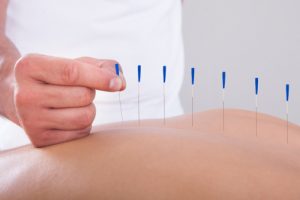 Women suffering from hot flashes because of breast cancer treatment side effects will welcome the news about acupuncture as a viable treatment.
Women suffering from hot flashes because of breast cancer treatment side effects will welcome the news about acupuncture as a viable treatment.
Scientists at the Perelman School of Medicine at the University of Pennsylvania have found that hot flashes are particularly severe and frequent in breast cancer survivors. These patients cannot rely on the current FDA-approved hormone replacement therapies for hot flashes because the therapies include estrogen.
Advertisement
The results of the study are published this week in the Journal of Clinical Oncology.
Hot flashes are brief episodes characterized by sensations of heat, racing heartbeat, flushing, and sweating. Until now there was no clear explanation as to how and why these hot flashes arise, but they are closely linked with low estrogen levels, which is why most people associate hot flashes with menopause. These unpleasant episodes also affect many breast cancer survivors who have low estrogen levels. Even though these women are not at the menopause age, treatment using chemotherapy for breast cancer, or breast cancer surgery, pushes them into premature menopause.
As part of the study, the research team worked with 120 breast cancer survivors who were having multiple daily episodes of hot flashes. The participants were divided into four different groups, each group had a different therapy for eight weeks.
Participants in group one were given a daily dose of 900 mg of the epilepsy drug gabapentin, which was earlier proven to be effective in reducing hot flashes in breast cancer patients.
Participants in group two were given gabapentin placebo.
Those in group three were subjected to electro-acupuncture, twice per week for two weeks, then once weekly. In this procedure embedded needles deliver weak electrical currents.
The last group was subjected to sham electro-acupuncture, wherein there was no actual needle penetration or electrical current.
After the eight-week treatment period, the researchers found that the participants in the electro-acupuncture group showed the best improvement in the hot flash composite score (HFCS). This is a standard measure of hot flash frequency and severity. They were followed by the sham acupuncture group, the gabapentin pill group and the placebo pill group – in that order.
The researchers also noted that in addition to the reductions in hot flash frequency/severity, both the acupuncture groups had fewer side effects than the pill groups.
Advertisement
What’s even more promising is that when the researchers surveyed the subjects 16 weeks after treatment ended, they found that the electro-acupuncture and sham electro-acupuncture groups had enjoyed a sustained – and even slightly increased – abatement of hot flashes. The pill-placebo patients also reported a slight improvement in symptoms, but in the gabapentin pill group the symptoms worsened.
According to lead author Jun J. Mao, M.D., MSCE, who is also an associate professor of Family Medicine and Community Health, the results of the study clearly show that managing hot flashes experienced by breast cancer survivors through the use of acupuncture holds a lot of promise.
Readers might be interested to know that previous studies have shown that electro-acupuncture has also been proven to be an effective treatment for joint pain in breast cancer patients.
